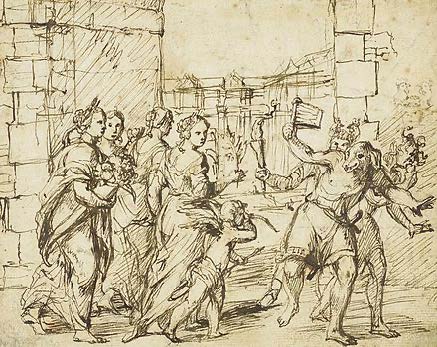According to Hallmark (2021), an estimated 145 million Valentine’s cards are exchanged each year - making Valentine’s Day the second biggest holiday for exchanging cards, following closely behind Christmas. It’s celebrated across the world from Canada to Australia. Yet, have you ever stopped to think about where this romance-filled holiday came from? I’ll give you a hint: Its roots are anything but romantic.

Contrary to popular belief that Valentine’s Day is celebrated after Saint Valentine, the Catholic Church recognizes at least three different Saint Valentines, each lacking substantial evidence. Roots of this romantic holiday can be found in the Roman festival “Lupercalia” - James Oliver explained the festival in his book Seasonal Feasts and Festivals - originally celebrated on the 15th of February, centered around the gods Lupercus, Pan, Fenruus, and Faunus. Seeing as these gods are all associated with agriculture and harvest, the celebration was in preparation of spring and promoted the fertility of land and its inhabitants. To paint the image for you, the ceremonies went along the lines of this: two naked young men sacrificed one dog and two goats, from which they smeared the blood over their foreheads, followed by a sacrificial feast. What happened next was unruly to say the least, the two naked men took the skin of the two goats and fastened them into whips called “februa”- laughing and whipping civilians of the town with their fresh februa. Surprisingly, the whippings were voluntary, and in some cases were done naked in public. It was believed to increase fertility, aid with childbirth, and offer protection from curses.


Lupercalia is the reason for our modern-day Valentine’s card exchange. The Encyclopedia of Religious Ethics (2022) explains this as the phenomena of the “Lovers Lottery”. Prior to the festival, the names of girls would be put into a jar in which a young man would pull from - in a “lottery” fashion - pairing them for the night, dancing, partying through Rome, binding them as partners for the rest of the year, in hopes of marriage, of course. Later being adopted by British culture (Brand & Ellis, 2008): On February 14th maids and bachelors would get together and write their names on slips that went into a jar of the same fashion in Lupercalia. Once the bachelors drew a maiden’s name, she would be then called his “Valentine”. He would shower her in treats and wear his Valentine’s name on his sleeve for the following days. The common saying “Don’t wear your heart on your sleeve” is said to originate from the Lover’s Lottery - bachelors would purposely wear their Valentine’s name on their sleeve to let everyone know that they are “spoken for”. As the 17th century approached, participants began exchanging love notes called “Valentine’s Cards”.
As time passed, the Lupercian lottery gave way to the tradition of Roman men expressing
their affection through hand-written cards to their “Valentines” on February 14. With the spread
of Christianity, the spread of Valentine's Day followed (Moore, 2006).
So, did you learn something new, fun, or interesting from this blog? I hope you did! You
may even share this with your Valentine this year.
Happy Valentine’s Day!
Trinity Singh, University of Guelph-Humber
Bachelor of Applied Science (in progress)
Student-intern, Rooted & Rising Psychotherapy
References
Brand, J., & Ellis, H. (2008/1872). Observations on the popular antiquities of Great Britain:
Chiefly illustrating the origin of our vulgar and provincial customs, ceremonies, and
superstitions. Bell & Dadly.
Encyclopedia of religious ethics. (2022). In J. Hastings (ed.), pp. 225-228. Wiley eBooks.
Hallmark. (2021, December 17). Valentine’s Day. Hallmark Corporate Information. Hallmark
Corporate. https://corporate.hallmark.com/holidays-occasions/valentines-day/.
James, E. O. (2021). Seasonal feasts and festivals. Hassell Street Press.
Moore, T. (2006). The Truth about Valentines Day. ResearchGate. https://www.researchgate.net/publication/339240484_The_Truth_about_Valentines_Day/referen ces

